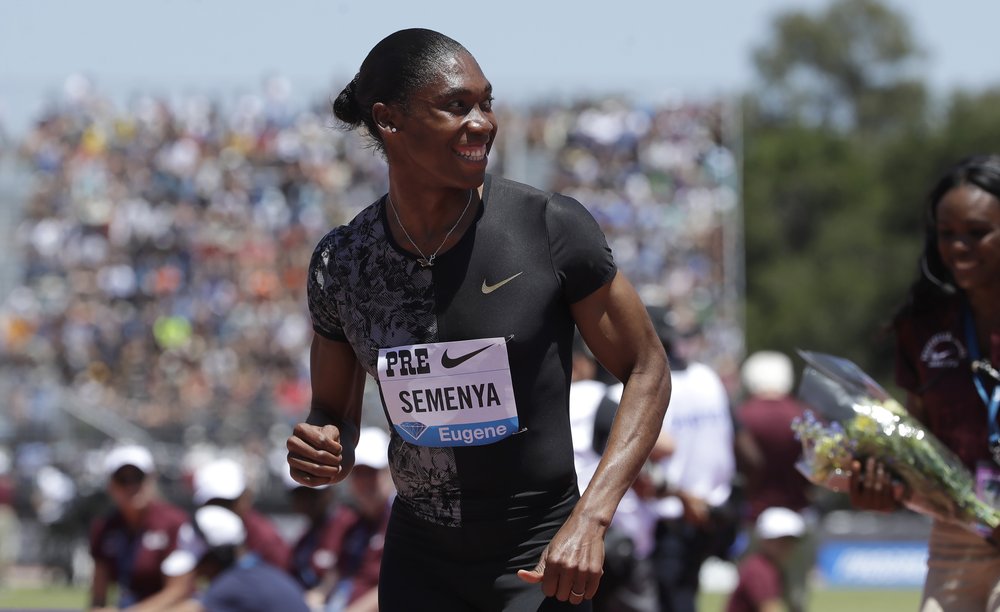
FILE – In this Sunday, June 30, 2019 file photo, South Africa’s Caster Semenya smiles after winning the women’s 800-meter race during the Prefontaine Classic, an IAAF Diamond League athletics meeting, in Stanford, Calif.. Caster Semenya has signed for a South African soccer club and may be considering giving up track and field. The Olympic 800-meter champion, who is currently in a legal battle with the IAAF over her right to compete without taking testosterone-suppressing medication, said she has joined women’s club JVW FC. (AP Photo/Jeff Chiu, File)
For a decade Caster Semenya kept running as track and field officials scrutinized her body, questioned her integrity, pushed her to take hormone-suppressing medication and even told her she wasn’t female.
But the Olympic champion may finally have had enough.
Semenya this week gave the strongest hint yet that she’s done with top-level athletics competition. And done, also, with the legal battles she’s been fighting against the IAAF for just about her entire career.
The 28-year-old Semenya said she has signed to play for a South African soccer club next year and will seemingly be focusing on a new career at home in that sport instead of the 2020 Tokyo Olympics, where she had a chance to win a third successive gold medal in the 800 meters.
A “new journey” is how she described it.
If Semenya is indeed retiring from running — there has been no official announcement from her — it will end a saga that has troubled women’s athletics ever since an 18-year-old Semenya arrived as an unknown at the 2009 world championships, won gold in a stunning show of dominance, and then focused attention on a dilemma so difficult that sport may never completely resolve it.
Semenya was born with the typical male XY chromosome pattern but also female characteristics. She was legally recognized as female at birth and has identified as female her entire life.
But her condition also means she has a testosterone level in the typical male range and that, according to disputed research from the IAAF, gives her an unfair athletic advantage over other female runners.
The IAAF decided that Semenya in her natural form should not be allowed to compete in certain events in women’s athletics, including the 800 meters, where the South African has won two Olympic golds and three world titles. Instead, she should take drugs to change her biology if she wants to run.
Semenya is not the only elite female athlete with a difference of sex development condition but she’s easily the most successful and the most prominent in taking a stand.
Currently, Semenya is barred from competing at top-level track meets because she has refused to follow the new rules — crafted specifically, she claims, because of her success — that force her to medically reduce her testosterone to a level that track officials are comfortable with.
“Hell no,” was Semenya’s reply when asked at the start of this season if she would submit and take medication.
Few realize that her answer was well-informed and not just a knee-jerk reply.
Semenya knows all too well what the process entails. At the start of her career and while still a teenager, Semenya did agree to take drugs to lower her testosterone. For five years from 2010-15 she swallowed oral contraceptives every day for no other purpose than to be allowed to run in international track events.
That part of her career is perhaps the least well-documented but may influence her current mindset more than any other. While she maintained her dignity on the track and never complained about her treatment in public, her private experiences were tumultuous.
It was only through redacted court documents released this year that the world was given a glimpse at them. Testifying at sport’s highest court, Semenya described how the medication caused a myriad of unwanted side effects like weight gain, fevers, a constant feeling of nausea and abdominal pain. A South African team doctor told how Semenya was left “visibly depressed” because of it.
No wonder Semenya doesn’t want to go through that again, even if it means no more worlds and no more Olympics. She would have to be on the medication near constantly for the rest of her career if she wanted to run at the top track meets.
Perhaps Semenya’s decision to quit, if this is the end, is her final act of defiance. She’ll walk away rather than submit to rules she strongly disagrees with and has challenged in two courts and counting.
But there should still be an element of regret from everyone — including the IAAF — if Semenya’s victory at the Prefontaine Classic on June 30 was her last race. Because of her talent, and her attitude.
“When I run I forget about everything. It’s just all about me,” Semenya said after that Prefontaine race. “It’s all about me being free. It’s all about me doing what I love.”